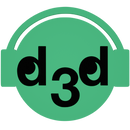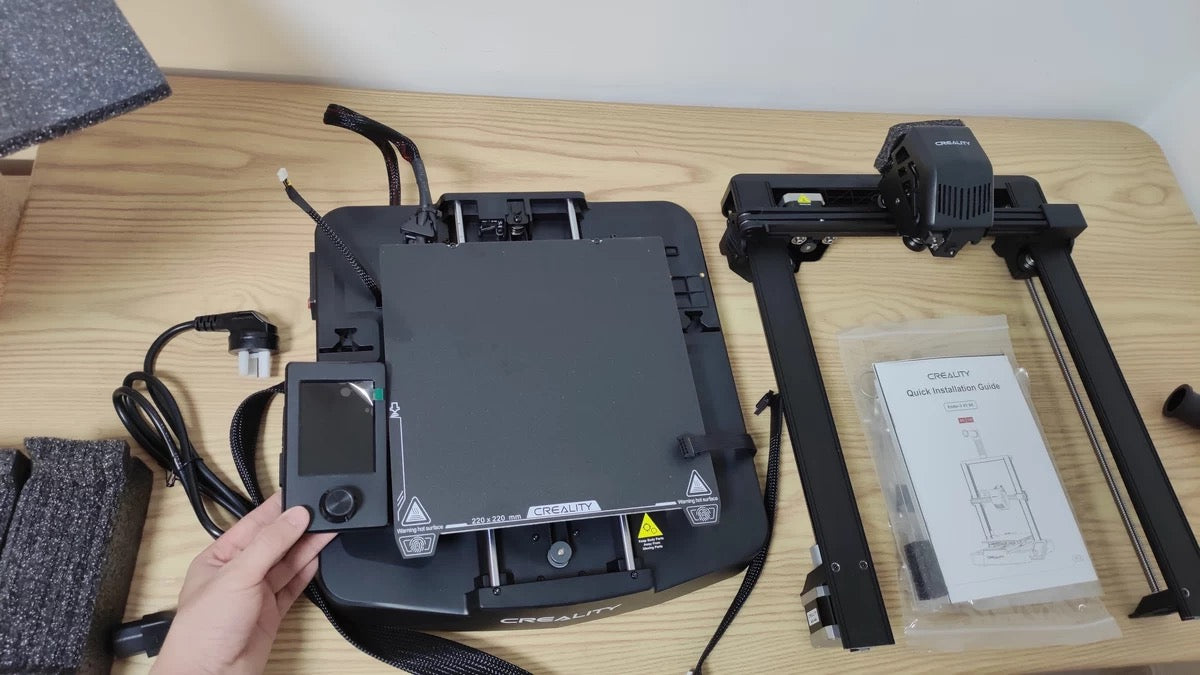Many of us started our 3D printing journey with an Ender 3. The Ender 3 V3 SE model we're reviewing today is particularly important in the 3D printing genre. The Creality Ender 3 V3 SE is a new low-cost version of the Ender 3 printer. It stands out because it incorporates lessons learned from the Ender 3 series and also from the K1 series machines. It is different from previous Ender 3 models and claims to have faster printing capabilities.
Ender 3 V3 SE Packaging List
Unboxing the package, we can see several items. There is a manual, stickers, and a declogger device. The toolkit includes an extra nozzle, specifically a Creality nozzle of a medium size. A full-sized SD card, tools, snips, and necessary hardware are also included. A small amount of filament is provided. Other components consist of a power cable, a screen, and a spool holder.

Assembly
The assembly process is fairly easy with just a few screws to attach the rails, LCD, and other components. Unlike the original Ender 3, which has multiple smaller sub-assemblies and lacks comprehensive assembly instructions (these are often found on the micro SD card, which can be confusing for newcomers), the Ender 3 V3 SE is much more straightforward. Once assembled, it resembles a more polished and modern I3-style printer.
This printer retains the single stepper motor for the Z-axis but adds a belt at the top to keep the lead screws in sync, preventing the gantry from sagging and maintaining accuracy.
Ender 3 V3 SE Upgrades on Ender 3
The Ender 3V3 SE offers a print volume of 220 x 220 x 250 mm, similar to the original Ender 3. However, it features several key upgrades:
- A color screen with a click-wheel interface (not a touchscreen, but a significant improvement).
- Connectivity options including a full-size SD card and USB-C, which is more durable than the micro SD card and micro USB slots on the original.
- A direct drive extruder, exceptional for the price, alongside a 32-bit control board with silent stepper drivers, greatly reducing print noise (the cooling fan remains the loudest component).Although a magnetic sheet is provided as the bed surface, upgrading to a PEI sheet is recommended.
- Linear rods for the bed instead of V-rollers, which tend to wear out faster.

Ender 3 V3 SE Features
It has a direct drive extruder and a larger heat block for higher temperature and faster printing, although it still has PTFE tubing limitations.
Bed Leveling and Print Surface
One of the most notable upgrades is the automatic mesh bed leveling, eliminating the need for manual bed leveling knobs and springs. The BLTouch-style probe and force sensor allow for precise nozzle offset calculation, crucial for beginners to avoid print issues.
The auto-leveling feature on this model is impressive, going through a three-step process and providing accurate Z offset measurements. The printer performed well in a squares test, showing good bed leveling.
It came with only one pre-sliced sample file, which took two hours to print, but when using a custom profile in Cura, the print time was reduced to 46 minutes without significant loss in print quality.
Ender 3 V3 SE Price
At a price point of $179, the Ender 3 V3 SE offers excellent value for beginners and budget-conscious makers. It far surpasses the original Ender 3 in user experience and print quality. However, if you can spend a bit more, options like the Sovol SV07, which offers advanced features like Wi-Fi connectivity and faster print speeds with Clipper, might be worth considering. For a seamless 3D printing experience with a smaller print volume, the Bambu Lab A1 Mini remains my top recommendation for beginners.
In Conclusion
Overall, the Ender3 V3 SE offers some nice features for beginners, such as easy assembly, auto-leveling, and a direct drive extruder, but it's not a fast printer. It is recommended for beginners looking for a budget-friendly option.
Ender 3 V3 SE Specifications
|
Ender3 V3 SE Parameters |
||||
|---|---|---|---|---|
| Model | Ender-3 V3 SE | |||
| Modeling Technolog | FDM | |||
| Modeling Dimensions | 220*220*250mm | |||
| Leveling Method | Auto-leveling with CR-Touch | |||
| Number of Nozzles | 1 pcs | |||
| Extruder Diameter | 0.4mm(standard) | |||
| Slice Thickness | 0.1-0.35mm | |||
| Precision | ±0.1mm | |||
| typical printing speed | 180mm/s | |||
| Maximum printing speed | 250mm/s | |||
| Acceleration | 250mm/s² | |||
| Nozzle Temperature | ≤260℃ | |||
| Hotbed Temperature | ≤100℃ | |||
| Ambient Temperature | 5℃-35℃ | |||
| Filaments | PLA/TPU(95A)/PETG | |||
| Rated Power | 350W | |||
| Input voltage | 100-120V,200-240V,50/60Hz | |||
| Power Loss Recovery | Yes | |||
| Printing Method | Storage card printing | |||
| File Format | STL/OBJ/AMF | |||
| Slicing Software | Creality print/Cura/ Repetier-Host/Simplify3D | |||
| Operating Systems | Windows/MAC/Linux | |||
| Language | 中文/English/ Espanol/Deutsche/Francais/PyccxwЙ/Portugués/Italiano/Turk/日本語 | |||
Filament Print Settings
| Recommended print paramaters for filaments | ||||||||
|---|---|---|---|---|---|---|---|---|
| Filament | Printing speed | Max_ hotbed temp | Nozzle temp | Drawback distance | Drawback speed | Fan speed | Adapetd dry box | Adapted protective cover |
| PLA | 180-250mm/s | 60℃ | 205℃ | 0.8mm | 40mm/s | 100% | NO | NO |
| TPU | 50mm/s | 70℃ | 205℃ | 1.6mm | 40mm/s | 100% | NO | NO |
| PETG | 120mm/s | 70℃ | 230℃ | 1.2mm | 40mm/s | 100% | YES | NO |

